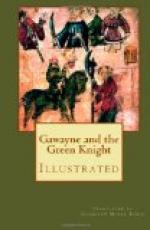To keep my heart in silence, not to hear
The words my whole soul hungers for, nor say
One syllable to brighten his dark day!
Must it be so, my queen? And how shall I
School eyes and lips to act this year-long lie?
From the dear teacher-guardian of my youth
The only ways I learned were ways of truth!
I tried my skill this night, and learned to know
That there are deeps below the deeps of woe;
Hearts may be bruised and broken, yet still live;—
The wounds that kill us are the wounds we give!”
And so these two talked on, until the night
Began to shiver with the gray dawn’s light,
And in the deep-dyed casement they might see
New life flush through old dreams of chivalry.
And then they parted. What the queen had said
I know not, but the lady, comforted,
Bade farewell with calm voice and tranquil eyes,
And saw with new-born strength the new sun rise.
Perhaps in Fairyland there chanced to be
For them that grieve some sovereign alchemy
To turn the worst to best, and the good queen
Applied this soothing balm. Such things have
been;
But yet I doubt if any fairy art
Was needed in the case of Elfinhart;
The medicine that charmed away her dole
Nature had planted in her own sweet soul.
Of all sure things, this thing I’m surest of,—
That the best cure for love’s own ills is love.
CANTO III
GAWAYNE
CANTO III
GAWAYNE
O Muse!—But no: heaven knows I need
a muse;
But which of all the nine, pray, should I choose?
Thalia, Clio, and Melpomene,
I love them all, but none, alas, loves me;
For if you want a muse to take your part
You must be solely hers with all your heart;
And I have mingled since my earliest youth
My smiles and tears, my fictions and my truth;
Nay, in this very tale, scarce yet half done,
I’ve courted all the nine, and so won none!
Not for me, therefore, the Parnassian lyre,
Or winged war-horse shod with heavenly fire;
Harsh numbers flow from throats whose thirst has been
A whole life long unslaked of Hippocrene;
But I will e’en go on as best I can
And let the story end as it began,—
A plain, straightforward man’s unvarnished word,
Part sad, part sweet,—and part of it absurd.
A year passed by, as years are wont to do,
Winter and spring, summer and autumn too,
Till mid-December’s flaw-blown flakes of snow
Warned Gawayne that the time was come to go
To the Green Chapel by the Murmuring Mere,
And take again the blow he gave last year.
In the great court his charger stamped the ground,
While knights and weeping ladies thronged around
To arm him (as the custom was of yore)
And bid him sad farewell for evermore.




